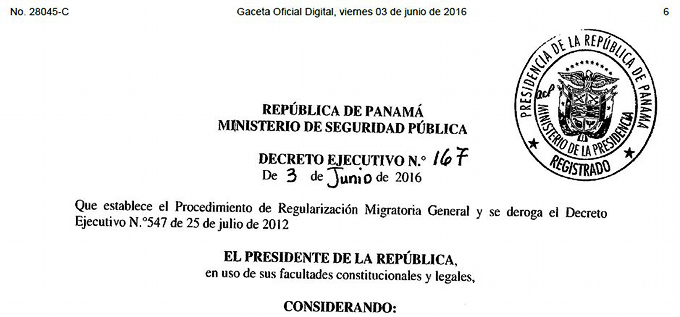
Immigration rules eased for some
by Eric Jackson
Some “permanent tourists” — people living here on tourist visas and in many cases carrying on economic activities not allowed under such visas — may be about to get a break. The Varela administration has announced some immigration policy changes.
The xenophobes are already complaining, much as they did about the previous Crisol de Razas program to regularize the status of foreigners who are living in Panama without benefit of proper immigration papers. The long-term problem of back then remains — there is a six-figure number of foreigners living here illegally or working here in violation of the terms of tourist or student visas, and the cost of rounding them all up and sending them back to from whence they came would not only be a great burden on law enforcement budgets, but it would also tear big holes in the Panamanian economy by eliminating productive workers and valuable customers.
What appears to be different from the context of the previous program is an ulterior economic motive. Ricardo Martinelli was out to smash the SUNTRACS construction workers’ union and public health care professionals’ unions by bringing in cheap foreign workers who would not be entitled to Social Security or any other benefits, but this does not seem to be Juan Carlos Varela’s purpose.
So on June 3, after consultations with some of Panama’s ethnic groups, the Ministry of Public Safety issued two new immigration decrees, number 167 and 168, the latter applying exclusively to persons from the People’s Republic of China. The American community, which does have immigration issues, was not part of any formal consultations but some allege that the influence of the US State Department was felt in the process.
The basic rules are that an applicant must:
- Have been living here for at least one year as of June 3, and if having left to renew a tourist visa, not have been gone for more than 30 days;
- Have no application for any change in immigration status that’s pending;
- Have no recent serious criminal record in his or her country of origin or here in Panama; and
- Personally appear for an interview with immigration officials.
There are all sorts of documents that an applicant must present to support his or her case — proof of residency for example by utility bills going back a year or more, two passport sized photos, copies of police records, a valid foreign passport and so on, in addition to forms that one must fill out. Surely to the consternation of lawyers, as was the case with the Crisol de Razas progam, none of these have to be submitted by an attorney.
There is a scale of fees. These start at a basic $500 for favored countries whose citizens do not have to get a visa other than as a tourist to enter Panama such as Canada, the United States and Colombia, go up to $1,000 for most countries without such agreements and are $2,000 for citizens of “restricted countries” such as most of Asia, Africa and the Caribbean. Under the separate Decree 168 it’s $2,500 for ciizens of the Peoples Republic of China. The fee discrimination goes back to the early decades of Panama’s history as an independent republic and there are plenty of people in our large Chinese community who resent it, but The Panama News is told that with all of their objections and reservations to the new decrees, most leaders of the Chinese community view the overall package as something mostly positive.
Two new requirements at a sponsor — and there is a bunch of paperwork for that — who must be a Panamanian citizen or legal permanent resident; and the applicant must register with Seguro Social and provide proof of that.
So how may people are going to get in? That seems to be up in the air. We are not yet told when the Migra will start taking applications, or where. We are told that at the end of the year we will be told how many people will be allowed to normalize their status during the following year — it’s not going to be an unlimited entitlement program, as the Crisol de Razas was alleged to be.
The requirement that an applicant had to have been here at least a year by June 3, 2016 puts this program in the intended category of a one-time amnesty possibility, rather than an invitation to newcomers.
Whether an application is accepted appears to involve a certain amount of discretion by public officials — a classic opportunity for bribery in an immigration systeme that has been notoriously corrupt. The applicant who is accepted gets a card that allows him or her to stay her for two years. After that, if she or he has stayed out of trouble, that immigration permit can be renewed.
~ ~ ~
These announcements are interactive. Click on them for more information.










